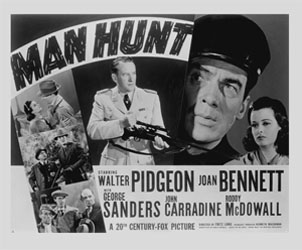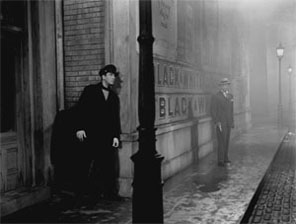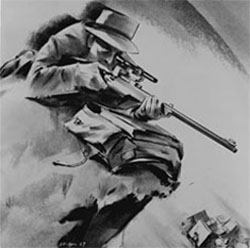By 1934, Fritz Lang was a legendary director in his homeland of Germany. So much so that rumors suggest Joseph Goebbels, one of Adolf Hitler’s closest associates, offered Lang a position as head of the German film studio UFA, which had become a producer of Nazi propaganda material. It’s not known whether Lang took the offer or not, but more than likely he was afraid for his life due to his Jewish heritage,  and no matter the niceties that were exhanged in the meeting, he soon quietly fled Germany and eventually found himself in Hollywood. Regardless of how we look at his early American efforts such as Fury now, he wasn’t as respected in the states as he was in Germany, and the opportunity to direct 1941’s Man Hunt, based on Geoffrey Household’s 1939 novel Rogue Male, came just in time. Not only did it prove that he was firmly opposed to the atrocities the Nazi party were partaking in, but it also finally showed American producers that they had a brilliant director at their disposal.
and no matter the niceties that were exhanged in the meeting, he soon quietly fled Germany and eventually found himself in Hollywood. Regardless of how we look at his early American efforts such as Fury now, he wasn’t as respected in the states as he was in Germany, and the opportunity to direct 1941’s Man Hunt, based on Geoffrey Household’s 1939 novel Rogue Male, came just in time. Not only did it prove that he was firmly opposed to the atrocities the Nazi party were partaking in, but it also finally showed American producers that they had a brilliant director at their disposal.
Alan Thorndike is a big-game hunter, but not in the traditional sense: he hunts humans. But it isn’t for keeps, it’s all for the fun of the hunt. He likes challenging himself to see if he can outsmart the smartest mammals on the planet, as he sees hunting animals as a bit unfair. He soon decides to see if he can track the biggest game of them all: Adolf Hitler. Being a man of extreme cunning, he does just that, as he aims his unloaded rifle, lines up the sight, and pulls the trigger…and then puts a bullet in the rifle’s chamber. Before he can decide whether he wants to really do the deed however, a guard patrolling the grounds spots him and he’s taken into custody.
It’s here that he’s introduced to a Gestapo leader named Major Quive-Smith, who will make all of this go away if Thorndike just signs a paper that says he was hired by the British government to assassinate Hitler. Thorndike realizes this could lead to the downfall of his country, so he refuses and is subjected to some nasty torture in an attempt to convince him. Still he won’t sign the paper, so Quive-Smith’s only alternative is to have him killed. Thorndike is thrown off of a cliff, but thanks to the muddy conditions below, he survives and escapes. When Quive-Smith comes to collect the body and realizes Thorndike is still alive and breathing, he sees the quandary he could potential be in and sets loose his dogs to track down the hunter, who has now become the hunted.
Man Hunt is an exercise in the type of taut suspense that Lang is known for, and very few others could ever hope to achieve. Lang has an uncanny knack at making even the most mundane seem menacing, and making the safest of places appear dangerous. The shadows consume nearly every inch of the frame, and with the heightened sense of uneasiness that permeates throughout the picture, the idea that something bad is lurking within them will always be at the back of your mind. That feeling of uneasiness even carries over into the wide open areas  (which include an incredible chase through the London Underground), when all is exposed and you’re looking evil in the face. Will they pull out a weapon? Could someone be coming up from behind? Is another party watching from a different vantage point? If you’re feeling paranoid just reading this, wait until you actually see it in action.
(which include an incredible chase through the London Underground), when all is exposed and you’re looking evil in the face. Will they pull out a weapon? Could someone be coming up from behind? Is another party watching from a different vantage point? If you’re feeling paranoid just reading this, wait until you actually see it in action.
While being able to create palpable suspense is hard enough, even some of the greatest white-knuckle classics from the 40s and 50s are guilty of traipsing familiar ground when it comes to certain elements. Take romance, for example. There’s nary a film from this era of Hollywood filmmaking that doesn’t include a storybook love affair plot thread, and most of us chalk it up as a product of the times. But Lang even refuses to play with convention in these respects. Yes, there is an underlying romanticism to the film, but it isn’t played out in a fashion that one would expect from a movie made in 1941. In fact, if you want to analyze things, while it’s never said outright, some of the implications of the relationship Thorndike sparks up with Jerry Stokes could be looked at as a golden age version of Pretty Woman. And it’s still not even as black and white as that; think everything is going to turn out all roses and kisses? Forgot we were talking about a Lang film, didn’t you?
Then there’s the very ending of Man Hunt, which again strays from the norm and is quite open ended for a studio picture from the period. It’s also eerily prophetic and timely, as it as much as says that the US knows that what’s going on in Germany can’t continue, and eventually something will have to be done. Released on June 13, 1941, Man Hunt was released only six months before the US entered World War II, and as history reports, the promise made here was certainly kept. In many ways, Man Hunt was indeed a propaganda film, an answer to the same type of films that were being produced in Germany at the same time. With Lang at the helm though, it isn’t overbearing and preachy whatsoever. Remove the Hitler influence, and the film would be just as thrilling, as at its core it concerns two men playing a game of human chess with one another, where lives hang in the balance.
If you’re already a fan of Fritz Lang, I probably don’t need to convince you to see Man Hunt; it’s among his best work while in Hollywood. If you’re not hip to the genius that is Mr. Lang however, you still owe it to yourself to give this one a chance, as I’ve never met a person yet that doesn’t like a film that features amazing suspense and a good game of cat and mouse, and Man Hunt is among the best you’ll find.

20th Century Fox issues Man Hunt on DVD for the first time ever, and they definitely don’t disappoint. Presented in its original full frame aspect ratio, the film looks fantastic, and outside of a minor scratch here and there is virtually flawless. Fox must take good care of their prints, as most of their DVD releases for classic films from the 40s and 50s look immaculate and this is no different. Audio is presented in both Dolby Digital mono for the purists and a simple 2-channel stereo mix for those that want something a bit more modern. Both of them sound crisp and clear, and I doubt those that don’t want their classics to be updated will find much to pick at when it comes to the stereo track.
Extras include a featurette entitled “Rogue Male: The Making of Man Hunt”, which has a number of film historians and authors (many of the same that are featured in many of Fox’s classic releases, like the John Brahm boxset) speaking about Lang’s storied career, Man Hunt itself, and the reverberations it caused due to a pact the US had made with Germany in regards to not being aggressive with one another. Patrick McGilligan, who is among the speakers in the making of, also provides a full length commentary for the film, which provides much of the same information, but in much greater detail. Also included is a short demonstration showing the work that went into the restoration of the film, a handful of galleries that show off stills, advertising, and artwork, and of course the film’s original theatrical trailer. At around $10, there’s no reason not to pick this up.
Please feel free to discuss "Man Hunt" here, in our forums!

